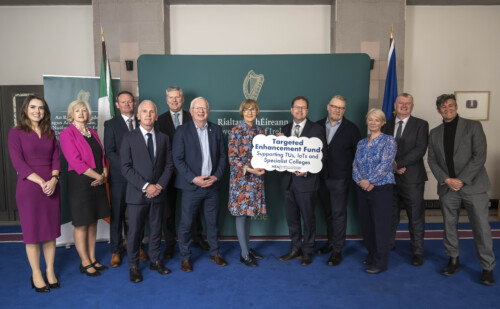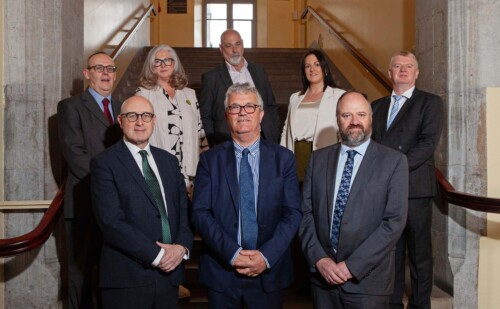
Minister Harris announces allocation of €34.33m in Transformation Funding for Technological Universities
By Maura O'Shea
Posted: 7 October, 2020
Minister for Further and Higher Education, Research, Innovation and Science, Simon Harris T.D, has today (07 October 2020) announced funding of €34.33m to higher education institutions to help them in their progression towards Technological University status.
The €34.33m fund is being allocated under the 2020 Higher Education Authority (HEA) call to assist the development and progression of technological universities.
Minister Harris said: “The creation of Technological Universities is a key commitment within the Programme for Government and will deliver significant advantages to national priorities in relation to Higher Education access, research-informed teaching and learning, as well as supporting enterprise and regional development”.
Minister Harris added: “The unparalled Government investment of €34.33 million this year and € 90 million over the lifetime of the Fund , will establish TUs across all regions capable of delivering national strategic objectives in accordance with the TURN report vision.
“This investment will help deliver for the benefit of their regions, communities and Ireland internationally.”
The TURN (TU Research Network) report “Connectedness & Collaboration enabled by Connectivity”, was published in October 2019 and sets out the case for a State change in higher education reform for the delivery of national strategic priorities.
This is to be achieved through the connectedness (particularly at regional level), collaboration and connectivity of technological universities and their unique delivery of programmes across the full range of the National Framework of Qualifications from apprenticeships to doctoral degrees.
CEO of the Higher Education Authority, Dr. Alan Wall, said: “The development of technological universities represents a radical re-structuring of the Irish higher education landscape. As anchor institutions in the regions, technological universities will drive and support social, cultural and economic development, as well as delivering an enhanced student experience and range of options”.
Dr Wall added “The HEA is pleased to lead this process and glad to see our higher education institutions’ commitment to the development and progression of technological universities. We will be closely monitoring progress of projects awarded funding in this round, to ensure continued growth in momentum and the tangible delivery of results from this investment. Should progress towards objectives stall or circumstances change, the HEA reserves the right to recoup or reallocate funds from
individual projects to maximise the ability to deliver on ambitions for technological universities, as set out in the TURN Report, Project Ireland 2040, Future Jobs Ireland and Horizon Europe”.
ENDS
For further information, please contact Catherine Halloran, HEA Communications
Notes for Editors
Background to the Technological University Transformation Fund (TUTF)
In Budget 2020, the Government announced the launch of a major multi-annual transformation fund of €90 million for technological universities over 3 years. The TUTF supersedes and builds upon Landscape Funding, as provided by the Higher Education Authority (HEA) and Department of Education and Skills (DES) in recent years, towards reform of the higher education landscape, including the establishment of Technological Universities.
The HEA is responsible for the design and implementation of the TUTF, with the Technological University Research Network (TURN) acting in an advisory capacity. The TURN comprises the President of TU Dublin and the Presidents of each institute of technology (IoT) participating in development consortia working towards TU designation, together with senior representatives from the Technological Higher Education Association (THEA) and the HEA.
Funding allocated through the TUTF will support the implementation of recommendations set out in the TURN group’s report “Connectedness & Collaboration enabled by Connectivity”, published in October 2019. The report makes a series of 12 recommendations for outcomes that will provide TUs with a solid foundation for their development. These centre upon three thematic areas that TURN identified as the essential building blocks for successful TUs:
· investment in integrated multi-campus digital infrastructure to provide regional cohesion and to facilitate new modes of learning and the prioritisation of capital investment in TUs;
· investment in research capacity building by developing researcher human capital, facilitating research activity and opportunities for existing academic staff and implementing a researcher career development and employment framework, addressing infrastructural deficits and prioritising research strategies within TUs, exploiting fully the mutually supporting roles of teaching and research; and
· realignment of the policy framework and funding for TUs including an expansion of institutional autonomy and reform through the implementation of TU-apposite career structures, the reform of the grant allocation model to accommodate TUs, the creation of a dedicated TU funding stream including in the post-establishment phase and the creation of a borrowing framework for TUs.
The report recognises that relevant priority actions can only be achieved through a structured, system-wide, relevant and dynamic process that will ensure value for money, underpinned by a robust and evidence-based set of monitoring and evaluation arrangements.
The TURN report can be accessed on the Department’s website at: https://www.education.ie/en/Publications/Education-Reports/connectedness-collaboration-through-connectivity.pdf
TU Dublin was established on 1 January 2019 and is the largest higher education institution in the State with over 28,000 students. The Munster Technological University, comprising Cork IT and IT Tralee, will be established as a technological university on 1 January 2021.
TU development consortia currently working towards TU Status include:
· Athlone IT and Limerick IT intend jointly making an application for TU designation in Autumn 2020.
· The Connaught Ulster Alliance consortium, comprising Galway-Mayo IT, Letterkenny IT and IT Sligo, is working towards submission of an application for TU designation towards the end of 2020/early 2021.
· The TUSEI consortium, comprising IT Carlow and Waterford IT, is developing an application, which it is expected will be submitted in March 2021.
Institutes of Technology currently unaligned with a TU development consortia are Dundalk Institute of Technology (DkIT) and the Institute of Art, Design and Technology (IADT), Dun Laoghaire.
· DkIT has indicated its commitment to becoming a technological university and is embarking upon a new three-year developmental pathway, with support from the HEA, to work towards realisation of this ambition for TU status.
· IADT will examine the viability and sustainability of establishing a National University of Creative Arts, under the Technological Universities Act, 2018, with one year exploratory funding and support from the HEA.
Table 1: Exchequer funding allocations, 1st Sept 2020 – 31st Aug 2021 (€ million)
| Project | Allocation 1st Sept 2020 – 31st August 2021 | Payable Q4 2020 | Payable Q1 2021 |
| AIT-LIT | €5.00m | €4.33m | €0.67m |
| CUA (GMIT/IT Sligo/LYIT) | €5.70m | €4.93m | €0.77m |
| DkIT | €0.76m | €0.66m | €0.10m |
| IADT | €0.10m | €0.10m | – |
| MTU (CIT/IT Tralee) | €8.25m | €7.14m | €1.11m |
| TU Dublin | €7.25m | €6.27m | €0.98m |
| TUSEI (WIT/IT Carlow) | €5.10m | €4.41m | €0.69m |
| IReL: TU Dublin, 2020 | €1.20m | €1.20m | – |
| EduCampus: TU Dublin, 2020 | €0.85m | €0.85m | – |
| HEA Monitoring/Resourcing | €0.12m | €0.12m | – |
| Total | €34.33m | €30.00m | €4.32m |


